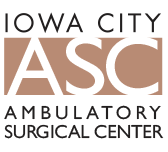How Is Life After A Totel Knee Replacement
icasc advantage blog
How Is Life After A Totel Knee Replacement
Posted by iowacityasc on Jan 21, 2021 3:10:43 PM
A total knee replacement surgery can be transformative. The activities you used to dread–climbing the stairs or getting out of bed–likely become routine once again. Life after a knee replacement can be challenging, especially in the months following your outpatient surgery. But patients generally enjoy significant improvements to their quality of life and pain levels that last for years or decades.

An Outpatient Procedure
The popular conception of knee replacement surgery often involves a several-days-long stay in a hospital setting. However, for many patients, life after a knee replacement procedure starts just several hours after their surgery. That’s because many total knee replacements can be performed as outpatient surgery.
When performed in a highly advanced surgical suite, such as the Iowa City Ambulatory Surgical Center, many patients return home on the same day as their surgery and can begin recovering from the comfort of their own bed.
Diminished Pain
The single most common symptom of a diseased knee joint is pain. Because of the osteoarthritis that inhibits smooth function, use of the knee becomes incredibly uncomfortable–and it’s usually at this point that people begin to realize just how often they rely on their knee joints. Just about every movement you make goes through your knees. Pain, therefore, can often be quite constant and difficult to control.
Thankfully, the most reliable outcome of knee replacement surgery is a decrease in overall joint pain. For most people, the source of knee pain is arthritic–bone growth that is a sign of disease in the knee, creating bone-grinding pain as a result. When the joint is removed, the pain caused by the disease also goes away.
The pain may not disappear entirely. But most patients report significant to total improvements in pain levels.
Improved Range of Motion
After your knee replacement surgery, you may experience an increased range of motion. However, there are important caveats to this particular outcome, so knowing what to expect after a knee replacement is essential.
First and foremost, improved range of motion does not always translate into perfect range of motion. It’s important to remember that your knee will have some limitations, and you may have to temporarily change the way that you do some minor activities (such as standing up from a chair or getting into a car).
Recovery Timeline
In general, you can expect your knee replacement recovery timeline to proceed along this general path, though every patient will be different:
- Day 1: Rehabilitation begins immediately. You’ll be given a walker, crutches, or a cane and provided with assistance standing on your knee.
- Day 2: You’ll undergo more practice standing and walking. These physical therapy sessions will usually be brief, but they are essential to a quick recovery.
- Day 21: By the third week, you should be much more mobile. You can begin walking and standing in 10 minute sessions. You may also begin to start lowering the amount of medications you’re taking to manage pain.
- Weeks 4-6: During this period, you should be able to return to work if you have a desk job. You should also begin to rely on your crutches or walker less and begin incorporating some normal activities into your daily life.
- Week 6 and beyond: You’ll want to check with your surgeon before resuming more activities. If you have a non-desk job, you may need to wait until the 3 month mark before resuming work. After that three month mark, you may also begin resuming other, more high intensity activities.
Much Depends on Your Physical Therapy
Once your knee begins to heal, you’ll start to undergo physical therapy sessions. The vigor with which you meet your physical therapy challenges will go a long way in influencing your possible range of activities after your operation. You should talk to your surgeon about what you can expect from your physical therapy and rehabilitation.
To optimize your body’s chances of achieving the best possible results, you’ll want to stick closely to your physical therapy routine, your medications, and your checkups.
Enjoying Your New Knee
Getting a total or partial knee replacement can lead to significant and enduring increases in your overall quality of life. It’s one of the reasons this procedure is so well regarded–and the right move for many patients. If you still have questions about what to expect after a knee replacement, talk to your surgeon to receive individualized answers.
The Iowa City Ambulatory Surgery Center is designed to provide surgeons with an effective and efficient setting to perform knee replacements as an outpatient surgery. If you want to know more about outpatient total knee replacement procedures, talk to your surgeon about your options today.
Topics: Orthopedic
Comments or Questions? Click Here!




